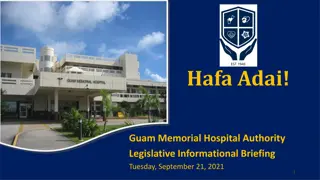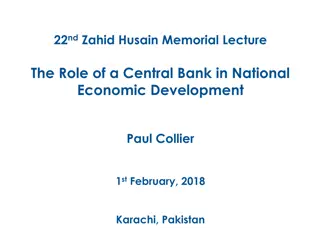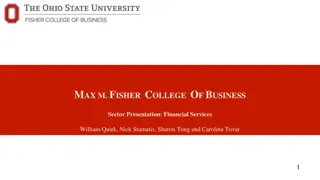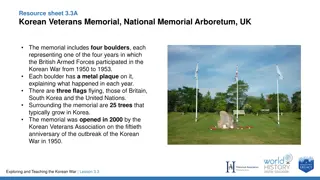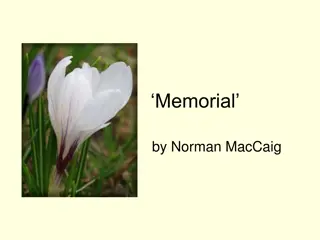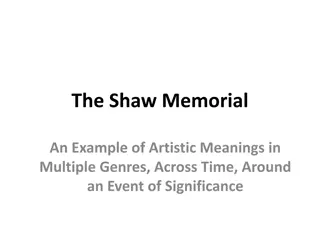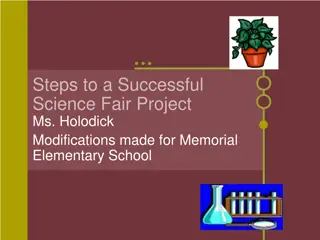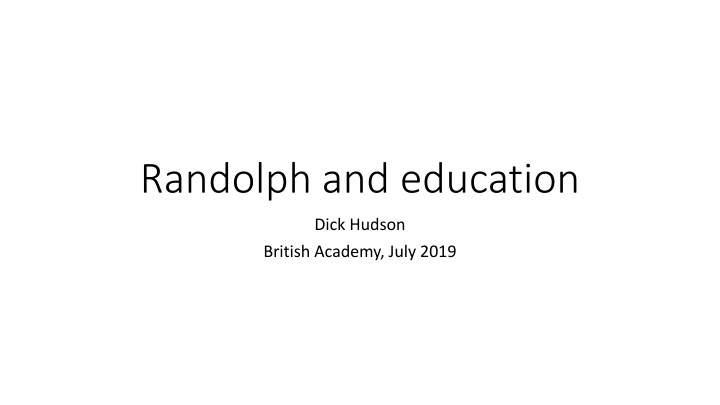
Randolph and Quirk: A Comparative Study in English Education History
Explore the intriguing similarities and differences between Sweet Henry Sweet and Randolph Quirk, two significant figures in the history of English education. Delve into their backgrounds, expertise, and contributions to the field, shedding light on the evolution of English grammar education over time.
Download Presentation

Please find below an Image/Link to download the presentation.
The content on the website is provided AS IS for your information and personal use only. It may not be sold, licensed, or shared on other websites without obtaining consent from the author. If you encounter any issues during the download, it is possible that the publisher has removed the file from their server.
You are allowed to download the files provided on this website for personal or commercial use, subject to the condition that they are used lawfully. All files are the property of their respective owners.
The content on the website is provided AS IS for your information and personal use only. It may not be sold, licensed, or shared on other websites without obtaining consent from the author.
E N D
Presentation Transcript
Randolph and education Dick Hudson British Academy, July 2019
Randolph was like Sweet Henry Sweet 1845-1912 Randolph Quirk 1920-2017 2
Similarities Sweet Quirk Expert on history of English Expert on history of English Built on leading scholarship (Germany) Leader in phonetics Built on leading scholarship (USA) Leader in comprehensive corpus grammar Committed to educational applications Committed to educational applications The Practical Study of Languages (1899) The Use of English (1962) 3
Differences Sweet Quirk A loner and a difficult colleague A leader and team player English + MFL = Modern Side vs Classics Grammar dominated all because of Classics English vs MFL Grammar dying in schools The main object of practical grammar is to ... help to give a mastery of foreign languages ... A good part of the purpose of teaching English Language is ... to sharpen awareness of the medium ... to encourage them to exploit the language s potentialities in their own use of it. 4
The gap between Sweet and Quirk [All from Walmsley forthcoming] After Sweet's New English Grammar [1898] no synchronic description of English of any significance was published in England for over forty [sixty?] years, except Harold Palmer s books for EFL. The contrast between this yawning gap in the English grammar landscape and what was going on elsewhere is striking. Germany: Deutschbein (1917), Kaluza (1900-01), Kr ger (1914-1917), Wendt (1911-14). The Netherlands: Poutsma (1904-1926), Kruisinga (1909-1912), Zandvoort (1945) Denmark: Jespersen (1909-1949) USA: Curme (1931-35) In effect, England had no scholars able and willing to engage with the synchronic description of English as their continental and north American colleagues were doing. 5
The absence of any study of modern English The view from outside Great Britain was not flattering. When the devastation of the Second World War (WWII) ended, continental scholars looked to the United Kingdom for leadership in this area, and a conference was organized at Oxford "to ascertain whether and in how far there exists a concensus of opinion concerning the principles of the study of modern English . . ." Not a single paper was offered by an English scholar on any aspect of contemporary English grammar. Zandvoort "We can hardly look to our English colleagues for much guidance in these matters . . . As far as British universities . . . are concerned, the study of modern English, apart, perhaps, from that of English phonetics, may be said to be non-existent." 6
Who filled the gap for schools? Ronald Ridout (1916-1994) author of English Today (and many other textbooks) So prolific was his output and huge his sales, exceeding seventy million, that he earned a place in The Guinness Book of World Records. [Wikipedia] e.g. Common errors in grammar and style (wrong) Sweep up the leaves which are now falling twice a week. (right) The leaves which are now falling you must sweep up twice a week. (reason) Departure from normal order. The word or phrase must stand reasonably near the word it qualifies. Ridout had no research to quote but probably wouldn t have read it even if it had existed. 7
1962: Annus mirabilis 1962 marked the beginning of a new era in English grammaticography. [Walmsley again] Barbara Strang (Newcastle): Modern English Structure Bill Mittins (Durham, Newcastle): Grammar of Modern English a teaching grammar Randolph Quirk (Durham and UCL): Use of English (Chapter 11) grammatical functions (S, V, C, A) played a central role. laid the foundations of the system for his blockbuster grammars and also for Michael Halliday s Systemic Functional Grammar? 8
Quirk on education: 1964 The English Language Problem in English in Education (published by NATE = National Assn for Teaching English), volume 1 It seems to be a matter of common consent that the teaching of English Language in this country is seriously unsatisfactory. But it is one thing to agree on this, and quite another to agree on a remedy or a priority among remedies. Criticism is generally focussed upon the 0 Level Examination in English Language ... Some observers even claim that English teaching and the pupils' use of English alike are actually harmed by the 0 Level examination, and that we would be better off if the mother tongue were not a classroom subject at all. 9
A vicious circle Others seek ways of improving the examination and the teaching that leads to it but are speedily confronted by the most vicious of vicious circles and the acute problem of where the circle is to be broken. The schools say that improvement can come only when there is a supply of teachers (and examiners) who have been trained on the new lines ... Departments of Education disclaim responsibility by pointing out ... that they can do little ... with trainees ... with Honours degrees in English which have little or no language component ... University English Departments in turn complain that freshmen come up ... after two or three years in a literature-orientated sixth-form - rather thoroughly predisposed to disfavour language study of any kind. The charge has now ricocheted back to the schools. 10
Despair sets in It would be easy to devise a thoroughly modernised 0 Level course and 0 Level examination that would be theoretically desirable in all respects... a new A Level examination which included a compulsory language component; a new Honours degree syllabus that gave a thorough grounding in the application of modern linguistic science to the English Language; ... But such root-and-branch change would be ineffectual while there is a desperate shortage of men and women who could teach such courses - at anyof the educational levels here mentioned.... There is little hope, in short, for any radical and rapid breaking of the vicious circle. 11
And yet ... But the circle is of course being broken. Several universities now offer English Honours students courses that readily link up with the problem of teaching the mother tongue in a new key, and many schools now have teachers who are capable of doing extremely interesting work with fifth and sixth formers which reflects the thinking of English linguists from Henry Sweet onwards. 12
Towards an A-level in English language ... to suggest the form and scope of a possible A Level English Language paper. 13
Exploring texts List the instances of passive voice in either A or D, discussing what you think may be the effect of selecting the passive as opposed to the active in these instances. Examine the kinds of metaphor you find in A and D, illustrating the distinctions you make; discuss with some linguistic precision the point at which a metaphor is to be regarded as a clich . List and discuss some colloquial features in C that you would not expect to find in A, and some formal features in A that you would not expect to hear in familiar conversation. 14
Exploring the system Carefully explain the difference in grammar between (a) He returned a new man andHe returned a new suit. (b) He found his cousin a flat and He found his cousin a bore. (c) A stainless steel cooker and A stainless linen cloth. Why is mathematics regarded as an ideal language? Discuss some of the ways in which it seems superior to ordinary English, and some of the ways in which it seems inferior. 15
And how did the story end? 1983: A-level English Language born (in Manchester). 2015: Eng Lang + Eng Lang & Lit = 48,000 entries so there are enough competent teachers for A-level. 2013: Grammar tested in primary schools so some primary teachers also know some grammar. 2014: GCSE English language could ask about language But ... GCSE English language is still seriously unsatisfactory . More generally, the curriculum contains very little language analysis. University English departments still tend to ignore language. English and MFL are still not collaborating. 16
The last word: a challenge from Randolph English language and the structural approach 1959 Even at the present time, no grammar-book has been produced for British schools that carries the sanction of the professional linguist ... 60 years later, this is still true below A-level. Shame on the government for promoting grammar without a textbook. BUT Randolph s Survey of English Usage has done better: Englicious a grammar-book online Driven by Randolph s successor, Bas Aarts. Randolph would have been so pleased. 17




